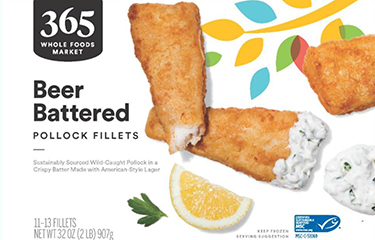SeafoodSource is closely following seafood-related food safety warnings and recalls by compiling a regular round-up of updates from the sector.
- Dover, Florida U.S.A.-based Tampa Bay Fisheries has issued a recall of 365 Whole Foods Beer Battered Pollock Fillets 12-ounce cartons and 30-ounce bags labeled with the UPC codes 9948249803 and 9948248051, and the lot number 32508201. The products have best-by dates between February and March 2025.
On 23 December, 2023, the FDA requested the voluntary recall of the beer-battered pollock due to an undeclared soy allergen. People with a soy allergy or sensitivity run the risk of serious or life-threatening allergic reactions, it said in a release.
Whole Foods has removed the product from its shelves. No illenesses have been reported to date related to consumption of the product, and beside the three lots recalled, no other lots were found to be affected.
-On 22 December, SAS Le Fumoir announced a recall of its pre-sliced vacuum-packed sliced smoked Norwegian salmon sold in France due to potential listeria monocytogenes contamination, according to RappelConso, a food safety website operated by the French government.
The sliced salmon has been available for purchase in France since 5 December, 2023. and has a best-by date of 1 January, 2024. It was issued under lot number 11173011.
- Quepos, Costa Rica-based Industrias Martec has suspended its exports of mahi to the U.S. after the U.S. Food and Drug Administration issued an import alert warning of decomposition in samples it tested.
The FDA issued the alert on frozen and fresh mahi shipments from Martec after inspection four containers the company sent to the U.S. between March and August 2023. In response, Martec said it would be pausing further mahi exports until it determines the origin of the problem.
Martec, which was bought by Panama-based Aquafoods Group in 2022, has appealed the ruling, according to La Nacion.
"[We have] filed a formal complaint before the FDA and showed our disagreement with their management, since we have samplings and quality controls both at the departure of the product, as well as upon its return," the company said. "We will continue to investigate and manage this issue by taking urgent actions to address this situation."
Martec's U.S. exports of tuna, snapper, and swordfish will continue, the company said.
- The U.S. Food and Drug Administration is warning that raw oysters distributed to restaurants from Canada in several U.S. states were illegally harvested and may be contaminated by pathogens.
On 22 December, the FDA issued an advisory on Pacific oysters illegally harvested on 8 November from BC 14-8, Landfile 1402294 and Pacific oysters harvested on 8 November and 9 The oysters were harvested in Fanny Bay and Maispina Inlet, British Columbia, Canada, and were distributed in the U.S. states of Utah and Wisconsin.
“Restaurants and retailers should not serve or sell the potentially contaminated oysters. Restaurants and retailers should dispose of any products by throwing them in the garbage or returning them to their distributor for destruction,” the agency said in a release.
The FDA was notified by the Utah Shellfish Authority on 18 December that two cases of Campylobacter were connected to the oysters involved in the FDA notification. Campylobacter causes gastroenteritis and diarrhea that can be severe in some cases.
The FDA said it will issue further guidance on its warning once it receives additional information regarding the U.S. distribution of the oysters from the Canadian Food and Drug Administration.
Photo courtesy of DCStockPhotography/Shutterstock







